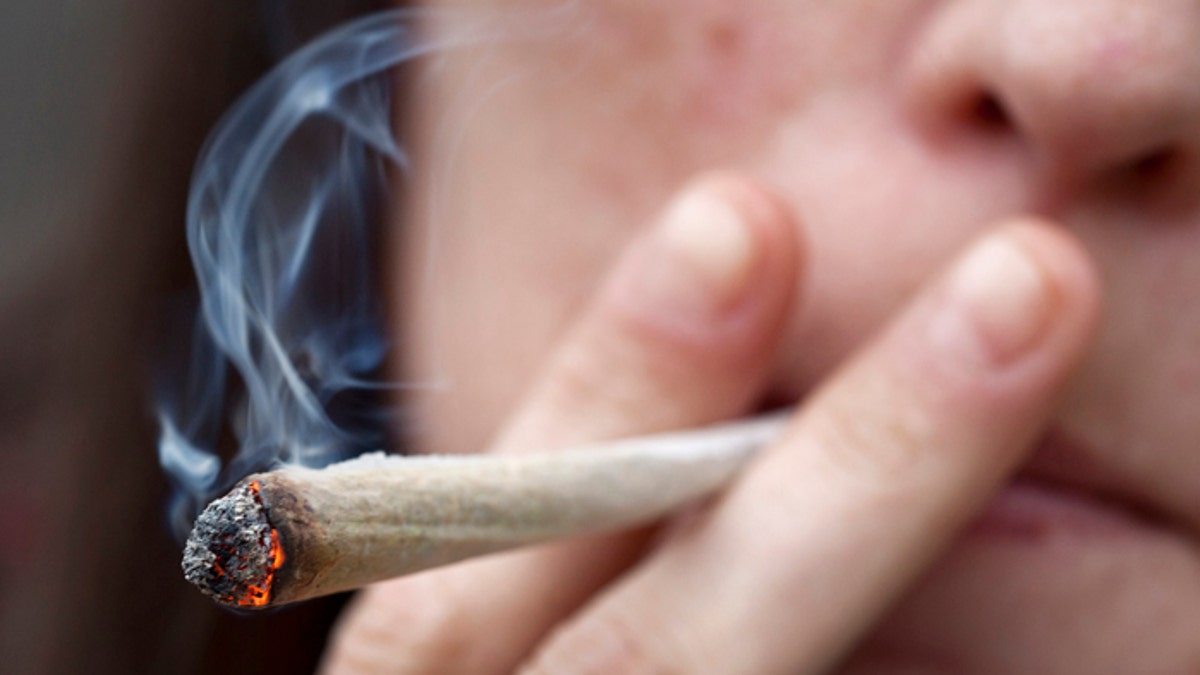
Heidi from Limburg, Belgium, smokes a joint in the Toermalijn coffee shop in Tilburg April 29, 2012. A controversial law that will make it harder for foreign tourists to buy cannabis at the Netherlands' famous coffee shops has been upheld by a Dutch court. The law, which goes into force in three southern provinces on May 1 before going nationwide next year, means coffee shops can only sell cannabis to registered members. Picture taken April 29, 2012. REUTERS/Michael Kooren (NETHERLANDS - Tags: SOCIETY BUSINESS DRUGS TRAVEL) - RTR31G54 (REUTERS/Michael Kooren)
There's an unexpected link between marijuana use and factors related to Type 2 diabetes that has medical researchers intrigued.
Several studies have found that marijuana users take in more food calories than nonusers, but they still have lower rates of obesity and diabetes, and lower average body mass index (BMI) levels.
In a new study, researchers investigated what effects marijuana and its active ingredient tetrahydrocannabinol (THC) might have on people's metabolism, especially insulin levels. [5 Diets That Fight Diseases]
Insulin resistance an important risk factor for diabetes is a metabolic disorder that occurs when the body's cells cannot properly intake insulin. The American Heart Association estimates 35 percent of U.S. adults have metabolic disorders that include insulin resistance.
To examine the link between THC and metabolism, researchers gathered the results of 4,657 adults from the National Health and Nutrition Examination Survey, a cross-sectional study administered annually by the Centers for Disease Control and Prevention.
Of the study's participants, 579 were current marijuana users, 1,975 had used the drug in the past but not recently, and 2,103 had never tried marijuana. Researchers analyzed the participants' fasting insulin levels, cholesterol levels, insulin resistance and waist sizes.
Multiple benefits seen
The results showed that the current marijuana users had 16 percent lower fasting insulin levels than nonusers, and 17 percent lower insulin-resistance levels.
Additionally, the regular users of marijuana had smaller average waist sizes, and higher levels of high-density lipoprotein (HDL) cholesterol, aka "good cholesterol."
"These are indeed remarkable observations that are supported by basic science experiments that came to similar conclusions," Dr. Joseph Alpert, professor of medicine at the University of Arizona College of Medicine, Tucson, said in a statement.
Interestingly, only the current users of marijuana (not the former users) experienced the positive results, suggesting that the effects of marijuana use on insulin and insulin resistance only occur after recent use.
To test their results, which were published in the latest issue of The American Journal of Medicine, the researchers also adjusted for participants who had been diagnosed with Type 2 diabetes.
Much more research needed
"After we excluded those subjects with a diagnosis of diabetes the associations between marijuana use and insulin levels, [insulin resistance], waist circumference and HDL-C were similar and remained statistically significant," Dr. Elizabeth Penner, a co-author of the study, said in a statement.
"Is it possible that THC will be commonly prescribed in the future for patients with diabetes or metabolic syndrome alongside antidiabetic oral agents or insulin for improved management of this chronic illness? Only time will answer this question for us," Alpert said in an editorial accompanying the article in the journal.
"We desperately need a great deal more basic and clinical research into the short- and long-term effects of marijuana in a variety of clinical settings such as cancer, diabetes and frailty of the elderly," Alpert wrote.
Copyright 2013 LiveScience, a TechMediaNetwork company. All rights reserved. This material may not be published, broadcast, rewritten or redistributed.
